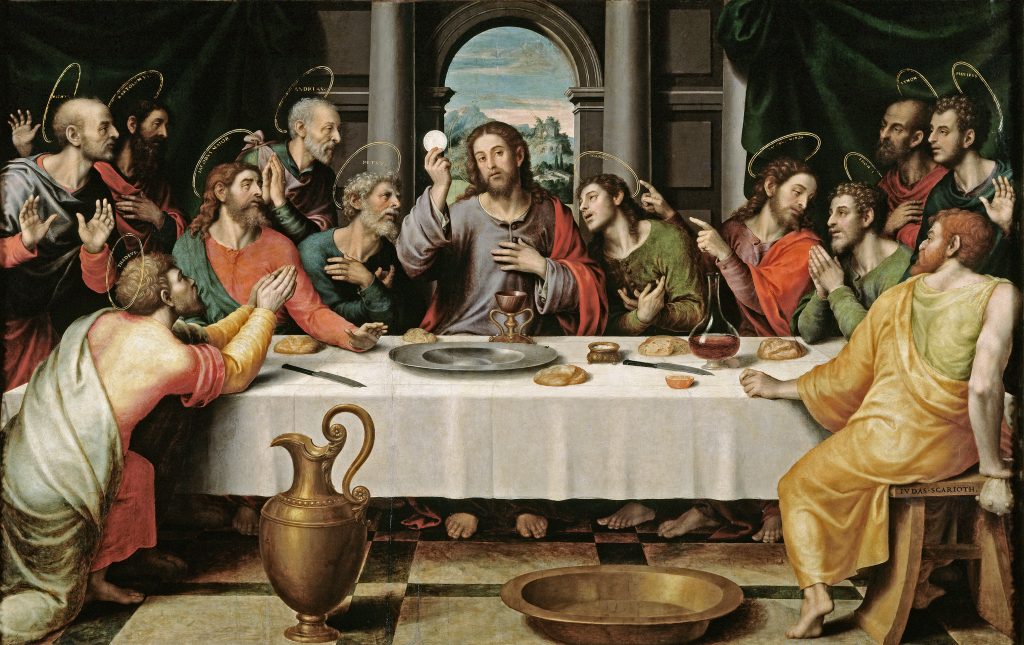
Lesson Objectives
- To finish reading the Old Testament (from Joshua to Malachi) and to read with understanding.
- To understand the broad outlines of the history of Israel in light of God’s covenant with Abraham.
- To appreciate the crucial importance of God’s everlasting covenant with David.
III. The Rights and Wrongs of Kings
A. Hannah the Handmaid
The establishment of the eternal kingdom of David, which occupies the rest of the Bible - including the New Testament - is prepared by Samuel, the last of Israel's judges.
Samuel is born in a time of political and moral chaos best reflected by the refrain of Judges - "in those days there was no king in Israel - everyone did what he thought best" (seeJudges 17:6; 18:1; 19:1; 21:25).
Israel's infidelity, symbolized by the corruption of Eli's priesthood (see 1 Samuel 2:12-17,27-36; 3:11-14) is punished by the attack of the Philistines, who kill 4,000 Israelites, including Eli's wicked sons, Hophni and Phineas, and carry off the Ark of the Covenant. Upon hearing of the Ark's theft, Eli topples back in his chair and breaks his neck and dies (see 1 Samuel 4).
Eli is succeeded by Samuel, born in answer to a barren woman's prayers and consecrated to God (see 1 Samuel 1).
Samuel's faithful mother, Hannah, prepares the way for Mary, the mother of Jesus (seeCatechism, no. 489). Three times, Hannah describes herself as the Lord's "handmaid," using the same term that Mary will use in vowing to bear Jesus (see 1 Samuel 1:11,16;Luke 1:38). In Mary's great song, the Magnificat, we will hear numerous echoes of Hannah's hymn of thanksgiving (compare 1 Samuel 2:1-10; Luke 1:46-55).
B. Making a Monarchy
Hannah's son Samuel grows up to be a good and holy man who succeeds in turning "the whole Israelite population" back to the Lord (see 1 Samuel 7:2-3).
But in his old age, the people demand that he appoint them a king "as the other nations have" (see 1 Samuel 8:5).
Israel's request is sinful, blasphemous. It shows that they still have not embraced their special character as God's chosen people, His first-born son.
"It is not you they reject," God tells Samuel. "They are rejecting Me as their king" (see 1 Samuel 8:7; 12:12,17,19-20).
Moses had predicted that the people would want a king. He even made provisions so that any Israelite king might truly serve God's purposes - requiring especially that the king copy the entire Law of God and read it every day for the rest of His life (see Deuteronomy 17:14-20).
The Israelites, however, aren't looking for a godly king. They tell Samuel they want one "to lead us in warfare and fight our battles" (see 1 Samuel 8:19-20). They don't mention God or worship and they seem to have utterly forgotten Israel's original charter to be a holy, priestly people (see Exodus 19:5-6).
In Saul, they get the kind of king they want, a man after their own heart - a warrior-king skilled in battle but with no concern for right worship or the commandments of God. Symbolically, during his first campaign Saul ignores Samuel's instructions and offers priestly sacrifices himself - something that God presumably didn't want His kings doing (see1 Samuel 13:8-13).
Other Lessons
- Lesson One: The Master Key that Unlocks the Bible
- To learn the "big-picture" overview of the Bible - the story that the Bible tells.
- To understand the concept of "covenant" and its importance for reading and interpreting the Bible.
- To learn in general detail the six major covenants in the Bible.
- Lesson Two: From Sabbath to Flood
- To read Genesis 1-12 with understanding.
- To learn the meaning of the first two covenants of salvation history - the Sabbath, and the covenant made with Noah.
- To begin to understand the "patterns" of biblical history.
- Lesson Three: Our Father, Abraham
- To read Genesis 12-50 with understanding.
- To understand God’s covenant with Abraham and to see how that covenant is fulfilled in the New Covenant of Jesus Christ.
- To appreciate key figures and elements in the Abraham story - Melchizedek, circumcision, the sacrifice of Isaac - as they are interpreted in the Church’s tradition.
- Lesson Four: The First-Born Son of God
- To read the Books of Exodus, Leviticus, Numbers, and Deuteronomy with understanding.
- To understand God’s covenant with Israel at Sinai and to see how this covenant looks forward to and is fulfilled in the New Covenant of Jesus Christ.
- To appreciate the key figures and events - Moses, the Passover, and the vocation of Israel as “a kingdom of priests” - as they are interpreted in the Church’s tradition.
- Lesson Six: The New and Everlasting Covenant
- To read the New Testament with understanding.
- To understand how the New Testament depicts Jesus as the fulfillment of the covenants of the Old Testament.
- To appreciate, especially, the importance of God’s everlasting covenant with David for understanding the mission of Jesus and the Church as it is presented in the New Testament.

